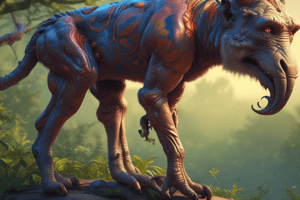Podcast
Questions and Answers
Define selective pressures
Define selective pressures
Environmental factors which may reduce reproductive success in a population and thus contribute to evolutionary change or extinction through the process of natural selection.
List some examples of selective pressures
List some examples of selective pressures
Competition, predation, disease, parasitism, land clearance, climate change and pollutants.
Define population
Define population
A group of organisms of the same species living together in a particular place and time.
Define gene pool
Define gene pool
Define allele frequency
Define allele frequency
Define species
Define species
What are the stages of speciation?
What are the stages of speciation?
Details of variation
Details of variation
Details of isolation
Details of isolation
Details of geographical barriers
Details of geographical barriers
Details of ecological barriers
Details of ecological barriers
Details of behavioural barriers
Details of behavioural barriers
Details of structural barriers
Details of structural barriers
Details of selection
Details of selection
Details of speciation
Details of speciation
Flashcards are hidden until you start studying
Study Notes
Selective Pressures
- Environmental factors that reduce reproductive success in populations.
- Contribute to evolutionary change or extinction through natural selection.
Examples of Selective Pressures
- Competition for resources.
- Predation risk.
- Disease occurrence.
- Parasitism effects.
- Impacts from land clearance and climate change.
- Pollution influencing survival.
Population
- A defined group of organisms from the same species, coexisting in a specific location and time.
Gene Pool
- The entire collection of genes within a given population.
Allele Frequency
- The proportion of a specific allele within a population.
Species
- Organisms capable of interbreeding under natural conditions to produce fertile offspring.
Stages of Speciation
- Variation: Differences within a population.
- Isolation: Separating populations, hindering mating and allele transfer.
- Selection: Differential survival and reproduction based on environmental pressures.
- Speciation: The formation of new species over time.
Variation
- Exists among individuals in a population, contributing to diversity.
- Certain variations may be more advantageous in specific environmental conditions.
Isolation
- Large populations can spread geographically but may form barriers, leading to isolation.
- Prevents mating and genetic exchange through geographical, ecological, behavioral, or structural barriers.
Geographical Barriers
- Physical obstacles such as mountain ranges, deserts, and large bodies of water.
Ecological Barriers
- Occur when populations utilize different habitats, reducing interactions.
Behavioral Barriers
- Differences in behaviors can prevent populations from mating.
Structural Barriers
- Physical incompatibilities, like non-complementary reproductive structures, hinder mating.
Selection
- Isolated populations may face distinct selection pressures, leading to changes in allele frequency over generations.
Speciation
- When isolated populations cannot interbreed and face differing environmental pressures, they may evolve into separate species over time.
Studying That Suits You
Use AI to generate personalized quizzes and flashcards to suit your learning preferences.




